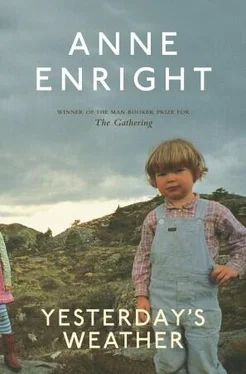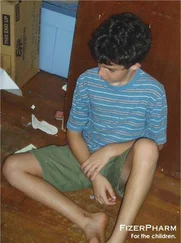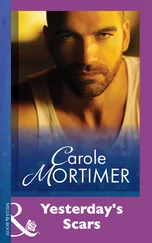When Ruth grew up she started to make shapes that were all about sound. She wove the notes of the scale in coloured strings. She turned duration into thickness and tone into shade. She overlapped the violins and the oboe and turned the roll of the drum into a wave.
It seemed to Ruth that the more beautiful a piece of music was, the more beautiful the shape it made. She was a successful sculptor, who brought all of her work home to her mother and said ‘Dream about this, Ma. Beethoven’s Ninth.’
Of course it worked both ways. She could work shapes back into the world of sound. She rotated objects on a computer grid and turned them into a score. This is the complicated sound of my mother sitting. This is the sound of her with her arm in the air. It played the Albert Hall. Her mother heard it all through the wood of her chair.
As far as people were concerned, friends and lovers and all the rest, she listened to them speak in different colours. She made them wonder whether their voices and their mouths were saying the same thing as their words, or something else. The whole message was suddenly complicated, involuntary and wise.
On the other hand, men never stayed with her for long. She caused the sound of their bodies to be played over the radio, which was, in its way, flattering. What they could not take was the fact that she never listened to a word they said. Words like: ‘Did you break the clock?’ ‘Why did you put the mirror in the hot press?’ ‘Where is my shoe?’
‘The rest is silence.’
When Ruth’s mother was dying she said ‘I will be able to hear in Heaven.’ Unfortunately, Ruth knew that there was no Heaven. She closed her mother’s eyes and her mouth and was overwhelmed by the fear that one day her world would be mute. She was not worried about going deaf. If she were deaf then she would be able to hear in her dreams. She was terrified that her shapes would lose their meaning, her grids their sense, her colours their public noise. When the body beside her was no longer singing, she thought, she might as well marry it, or die.
She really was a selfish bastard (as they say of men and angels).
Cathy was often wrong, she found it more interesting. She was wrong about the taste of bananas. She was wrong about the future of the bob. She was wrong about where her life ended up. She loved corners, surprises, changes of light.
Of all the fates that could have been hers (spinster, murderer, savant, saint), she chose to work behind a handbag counter in Dublin and take her holidays in the sun.
For ten years she lived with the gloves and beside the umbrellas, their colours shy and neatly furled. The handbag counter travelled through navy and brown to a classic black. Yellows, reds, and white were to one side and all varieties of plastic were left out on stands, for the customer to steal.
Cathy couldn’t tell you what the handbag counter was like. It was hers. It smelt like a leather dream. It was never quite right. Despite the close and intimate spaces of the gloves and the empty generosity of the bags themselves, the discreet mess that was the handbag counter was just beyond her control.
She sold clutch bags for people to hang on to; folded slivers of animal skin that wouldn’t hold a box of cigarettes, or money unless it was paper, or a bunch of keys. ‘Just a credit card and a condom,’ said one young woman to another and Cathy felt the ache of times changing.
She sold the handbag proper, sleek and stiff and surprisingly roomy — the favourite bag, the thoroughbred, with a hard clasp, or a fold-over flap and the smell of her best perfume. She sold sacks to young women, in canvas or in suede, baggy enough to hold a life, a change of underwear, a novel, a deodorant spray.
The women’s faces as they made their choice were full of lines going nowhere, tense with the problems of leather, price, vulgarity, colour. Cathy matched blue eyes with a blue trim, a modest mouth with smooth, plum suede. She sold patent to the click of high heels, urged women who had forgotten into neat, swish reticules. Quietly, one customer after another was guided to the inevitable and surprising choice of a bag that was not ‘them’ but one step beyond who they thought they might be.
Cathy knew what handbags were for. She herself carried everything (which wasn’t much) in one pocket, or the other.
She divided her women into two categories: those who could and those who could not.
She had little affection for those who could, they had no need of her, and they were often mistaken. Their secret was not one of class, although that seemed to help, but one of belief, and like all questions of belief, it involved certain mysteries. How, for example, does one believe in navy?
But there were also the women who could not. A woman for example, who could NOT wear blue. A woman who could wear a print, but NOT beside her face. A woman who could wear beads but NOT earrings. A woman who had a secret life of shoes too exotic for her, or one who could neither pass a perfume counter nor buy a perfume, unless it was for someone else. A woman who comes home with royal jelly every time she tries to buy a blouse.
A woman who cries in the lingerie department.
A woman who laughs while trying on hats.
A woman who buys two coats of a different colour.
The problem became vicious when they brought their daughters shopping with them. Cathy could smell these couples coming, all the way from Kitchenware.
Cathy married late and it was hard work. She had to find a man. Once she had found one, she discovered that the city was full of them. She had to talk and laugh and be fond. She had to choose. Did she like big burly men with soft brown eyes? Did she like that blond man with the eyes of pathological blue? What did she think of her own face, its notches and dents?
In the end, she went the easy road with a kind teacher from Fairview and a registry office do. She stole him from a coltish young woman with awkward eyes. Cathy would have sold her a tapestry Gladstone bag, one that was ‘wrong’ but ‘worked’ all the same.
Sex was a pleasant surprise. It was such a singular activity, it seemed to scatter and gather her at the same time.
Cathy fell in love one day with a loose, rangy woman, who came to her counter and to her smile and seemed to pick her up with the same ease as she did an Argentinian calfskin shoulder bag in tobacco brown, with woven leather inset panels, pig-skin lining and snap clasp. It was quite a surprise.
The woman, whose eyes were a tired shade of blue, asked Cathy’s opinion, and Cathy heard herself say ‘DIVE RIGHT IN HONEY, THE WATER’S JUST FINE!’ — a phrase she must have picked up from the television set. The woman did not flinch. She said ‘Have you got it in black?’
Brown was the colour of the bag. Cathy was disappointed by this betrayal. The weave would just disappear in black, the staining was everything. Cathy said, ‘It’s worth it in brown, even if it means new shoes. It really is a beautiful bag.’ The woman, however, neither bought the brown nor argued for black. She rubbed the leather with the base of her thumb as she laid the bag down. She looked at Cathy. She despaired. She turned her wide, sporting shoulders, her dry, bleached hair, and her nose with the bump in it, gave a small sigh, and walked out of the shop.
Cathy spent the rest of the day thinking, not of her hands, with their large knuckles, but of her breasts, that were widely spaced and looked two ways, one towards the umbrellas, the other at the scarves. She also wondered whether the woman had a necklace of lines hanging from her hips, whether she had ever been touched by a woman, what she might say, what Cathy might say back. Whether her foldings and infoldings were the same as her own or as different as daffodil from narcissus. It was a very exciting afternoon.
Читать дальше












